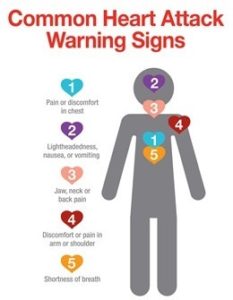By Matthias Samuel
 A heart attack is a serious medical emergency in which the supply of blood to the heart is suddenly blocked, usually by a blood clot. According a study, 30 to 40% of all deaths in Pakistan are due to heart attacks, in-fact Pakistani population has one of the highest risks of heart disease in the world. This is due to tobacco use, alcohol use, high blood pressure, high cholesterol, obesity, diabetes, physical inactivity, stress and the worst of all unhealthy diet.
A heart attack is a serious medical emergency in which the supply of blood to the heart is suddenly blocked, usually by a blood clot. According a study, 30 to 40% of all deaths in Pakistan are due to heart attacks, in-fact Pakistani population has one of the highest risks of heart disease in the world. This is due to tobacco use, alcohol use, high blood pressure, high cholesterol, obesity, diabetes, physical inactivity, stress and the worst of all unhealthy diet.
Symptoms of heart attack
Following are the symptoms of heart attack:
- Chest pain, the chest can feel like it is being pressed by a heavy object, and it can cause pain from the chest to the jaw, neck, arms and back.
- Shortness of breath.
- Feeling weak or lightheaded, or both.
- An overwhelming feeling of anxiety.
- Cold sweat.
Safety precautions
Heart disease may be a leading cause of death, but that does not mean that you have to accept it as your fate and let it be. Although no one has the power to change some risk factors, such as family history or age.
Following are some prevention steps that can be taken to reduce your risk of heart attack:
- Do not smoke or use tobacco, Smoking or using tobacco of any kind is one of the most significant risk factors for developing heart disease. Chemicals in tobacco can damage your heart and blood vessels.
- Exercise for about 30 minutes, some regular, daily exercise can reduce your risk of heart disease. And when you combine physical activity with other lifestyle measures, such as maintaining a healthy weight, the payoff is even greater.
- Eat a heart-healthy diet, a diet rich in fruits, vegetables and whole grains can help protect your heart. Aim to eat beans, low-fat or fat-free dairy products, lean meats, and fish as part of a healthy diet.
- Avoid too much salt and sugars in your diet.
- Get enough quality sleep.
- Manage stress.
Matthias Samuel is a student of history in Quaid-i-Azam University (QAU) Islamabad, and occasionally writes blogs and articles.




